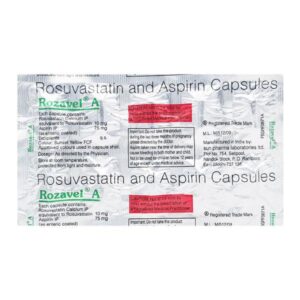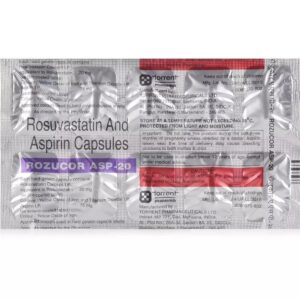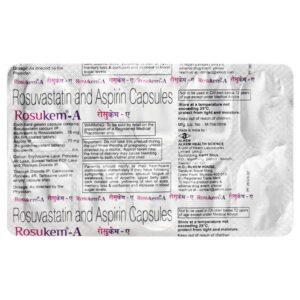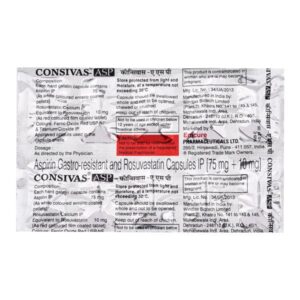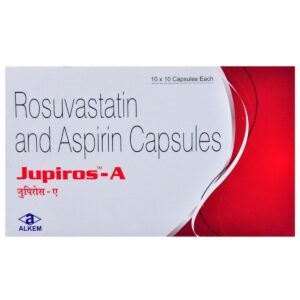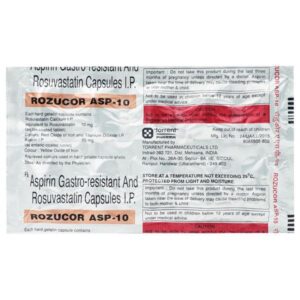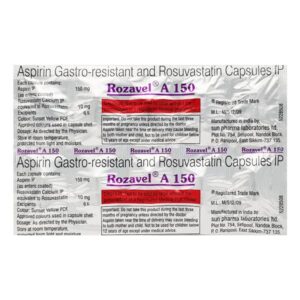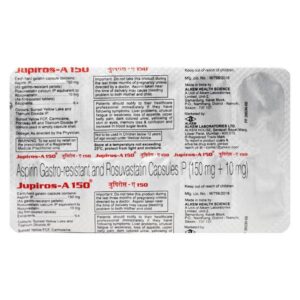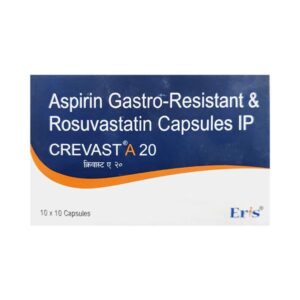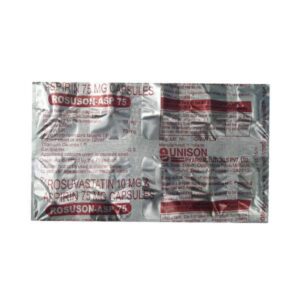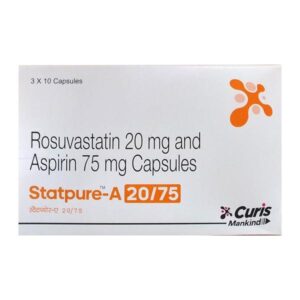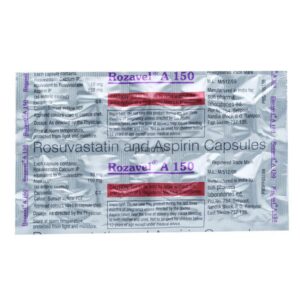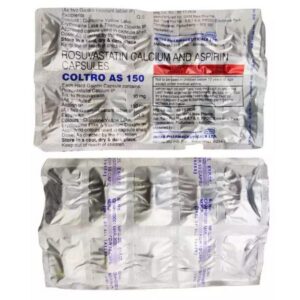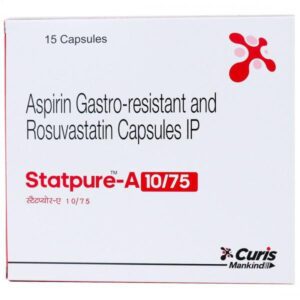ACETYL SALICYLIC ACID (ASA OR ASPIRIN) + ROSUVASTATIN
Acetyl Salicylic Acid (asa Or Aspirin): Acetyl Salicylic Acid, also known as Aspirin, is a widely used medication that primarily functions as an analgesic (pain reliever), antipyretic (fever reducer), and anti-inflammatory agent. It belongs to the class of drugs known as salicylates.
Aspirin is commonly used to relieve mild to moderate pain, including headaches, muscle aches, menstrual cramps, toothaches, and pain associated with arthritis. It is also effective in reducing fever and inflammation caused by various conditions, such as rheumatic fever, pericarditis, and certain types of arthritis.
The mechanism of action of Aspirin involves inhibition of cyclooxygenase (COX) enzymes. COX enzymes are responsible for the synthesis of prostaglandins, which are chemical messengers that promote inflammation, pain, and fever. By inhibiting COX enzymes, Aspirin reduces the production of prostaglandins, thereby relieving pain, fever, and inflammation.
The recommended dose of Aspirin varies based on the condition being treated. For mild to moderate pain and fever, a typical dose for adults is 325 to 650 mg every 4 to 6 hours, with a maximum daily dose of 4,000 mg. For long-term use in conditions like arthritis, lower doses ranging from 75 to 325 mg daily are often prescribed.
Although Aspirin is generally considered safe when used appropriately, it may cause some side effects. Common side effects include stomach upset, heartburn, and gastrointestinal irritation. In rare cases, Aspirin can lead to stomach ulcers, gastrointestinal bleeding, or perforation. Prolonged or high-dose use of Aspirin may increase the risk of bleeding, especially in individuals with bleeding disorders or taking anticoagulant medications.
A more serious but rare potential side effect of Aspirin is Reye’s syndrome, which primarily affects children and teenagers recovering from viral infections, particularly flu or chickenpox. To reduce the risk of Reye’s syndrome, Aspirin is generally avoided in children and teenagers, especially those with viral illnesses.
Additionally, Aspirin should be used with caution in individuals with certain medical conditions, such as asthma, liver or kidney disease, stomach ulcers, bleeding disorders, or a history of allergic reactions to nonsteroidal anti-inflammatory drugs (NSAIDs).
It is crucial to consult a healthcare professional for advice on appropriate dosing and to discuss any potential contraindications or interactions with other medications before using Aspirin.
Rosuvastatin: Rosuvastatin, sold under the brand name Crestor, is a medication classified as a statin. It is primarily used to lower cholesterol levels and reduce the risk of cardiovascular disease.
The mechanism of action of rosuvastatin involves inhibiting the enzyme HMG-CoA reductase, which plays a vital role in the production of cholesterol in the liver. By inhibiting this enzyme, rosuvastatin reduces the amount of cholesterol produced, leading to decreased levels of LDL (low-density lipoprotein) cholesterol, commonly known as “bad” cholesterol. Additionally, it modestly increases HDL (high-density lipoprotein) cholesterol, often referred to as “good” cholesterol.
The recommended dose of rosuvastatin varies depending on the patient’s age, cholesterol levels, and specific medical condition. Typically, the initial dose ranges from 5 to 10 mg per day, which may be increased up to a maximum dose of 40 mg per day if necessary. It is important to follow the dosage instructions provided by a healthcare professional.
Common side effects of rosuvastatin include headache, muscle pain, joint pain, nausea, abdominal pain, and constipation. In rare cases, it may cause more serious side effects such as liver problems, muscle breakdown, or kidney issues. It is essential to inform a healthcare provider immediately if any unusual symptoms or side effects occur.
As with any medication, it is important to use rosuvastatin under the guidance of a healthcare professional and alongside other cholesterol-lowering measures such as a healthy diet, regular exercise, and weight management. Regular monitoring of cholesterol levels and liver function is advised to ensure the drug’s effectiveness and safety.

